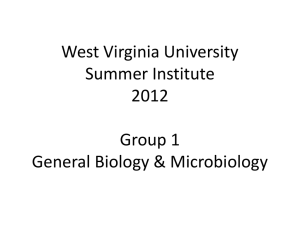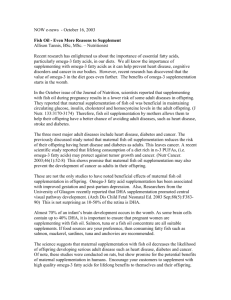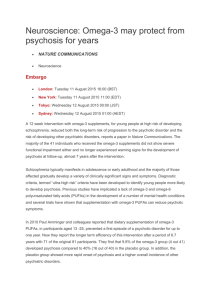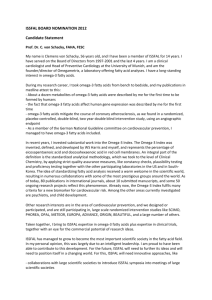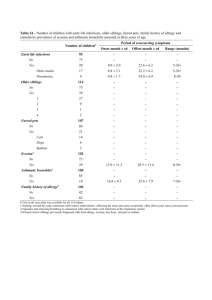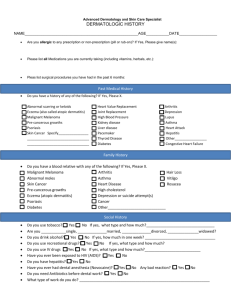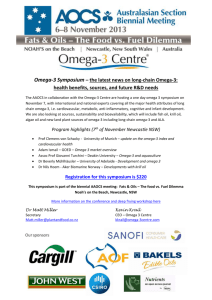Eczema Domino Mother Baby Release FINAL
advertisement
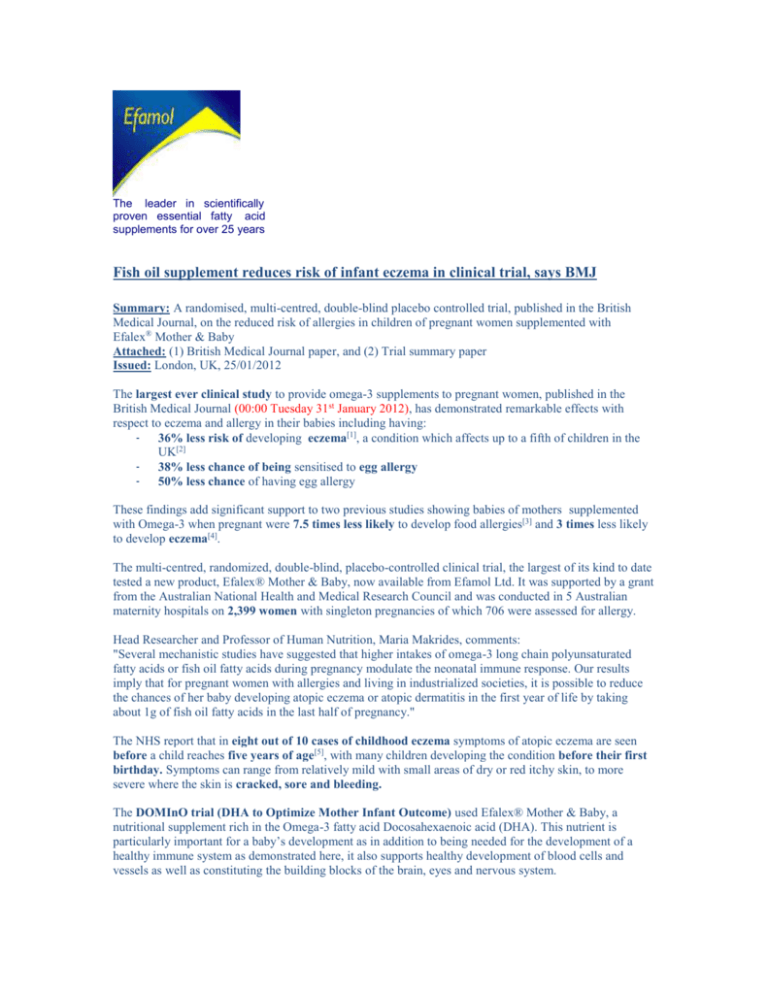
The leader in scientifically proven essential fatty acid supplements for over 25 years Fish oil supplement reduces risk of infant eczema in clinical trial, says BMJ Summary: A randomised, multi-centred, double-blind placebo controlled trial, published in the British Medical Journal, on the reduced risk of allergies in children of pregnant women supplemented with Efalex® Mother & Baby Attached: (1) British Medical Journal paper, and (2) Trial summary paper Issued: London, UK, 25/01/2012 The largest ever clinical study to provide omega-3 supplements to pregnant women, published in the British Medical Journal (00:00 Tuesday 31st January 2012), has demonstrated remarkable effects with respect to eczema and allergy in their babies including having: - 36% less risk of developing eczema[1], a condition which affects up to a fifth of children in the UK[2] - 38% less chance of being sensitised to egg allergy - 50% less chance of having egg allergy These findings add significant support to two previous studies showing babies of mothers supplemented with Omega-3 when pregnant were 7.5 times less likely to develop food allergies[3] and 3 times less likely to develop eczema[4]. The multi-centred, randomized, double-blind, placebo-controlled clinical trial, the largest of its kind to date tested a new product, Efalex® Mother & Baby, now available from Efamol Ltd. It was supported by a grant from the Australian National Health and Medical Research Council and was conducted in 5 Australian maternity hospitals on 2,399 women with singleton pregnancies of which 706 were assessed for allergy. Head Researcher and Professor of Human Nutrition, Maria Makrides, comments: "Several mechanistic studies have suggested that higher intakes of omega-3 long chain polyunsaturated fatty acids or fish oil fatty acids during pregnancy modulate the neonatal immune response. Our results imply that for pregnant women with allergies and living in industrialized societies, it is possible to reduce the chances of her baby developing atopic eczema or atopic dermatitis in the first year of life by taking about 1g of fish oil fatty acids in the last half of pregnancy." The NHS report that in eight out of 10 cases of childhood eczema symptoms of atopic eczema are seen before a child reaches five years of age[5], with many children developing the condition before their first birthday. Symptoms can range from relatively mild with small areas of dry or red itchy skin, to more severe where the skin is cracked, sore and bleeding. The DOMInO trial (DHA to Optimize Mother Infant Outcome) used Efalex® Mother & Baby, a nutritional supplement rich in the Omega-3 fatty acid Docosahexaenoic acid (DHA). This nutrient is particularly important for a baby’s development as in addition to being needed for the development of a healthy immune system as demonstrated here, it also supports healthy development of blood cells and vessels as well as constituting the building blocks of the brain, eyes and nervous system. Efalex® Mother & Baby helps encourage healthy pregnancy and birth by delivering the Long Chain Omega-3 Fatty Acids necessary to replenish the naturally-depleted levels in expectant mothers especially where the recommended two portions of oily fish are not being eaten. Dr Alex Richardson, Senior Research Fellow at the Centre for Evidence Based Intervention, University of Oxford, and co-founder of the UK charity Food and Behaviour Research, comments: “Most people in the UK consume less than the Government’s recommended daily intake of long-chain omega-3 fatty acids, [i] and it is particularly vital to address this deficiency during pregnancy. Many previous studies have shown these omega-3 to be essential for the normal development and future health of the unborn baby, as well as the health of the mother. In this trial – the largest of its kind –supplementation during pregnancy led to highly significant reductions in many factors such as prematurity and low birth weight that can adversely affect children’s development and wellbeing over their lifetimes. These latest findings now show that omega-3 supplementation during pregnancy also led to dramatic reductions in the proportions of children suffering from either atopic eczema or allergic sensitisation to egg protein, confirming the importance of these nutrients for healthy immune system development. All expectant mums need to ensure a good dietary intake of the long-chain omega-3 fatty acids found in fish and seafood, and for any women who choose not to eat these foods, supplementation offers a safe and effective way to ensure an adequate supply.” In addition, a variety of other studies have linked maternal and infant DHA levels to additional benefits in the baby’s development including increased gestation and improved visual acuity (at age 6 months) [ii], as well as enhanced sleep patterns[iii]and mental processing[iv],[v] ENDS Furuhjelm C, Warstedt K, Larsson J et al. Fish oil supplementation in pregnancy and lactation may decrease the risk of infant allergy. Acta Paediatr 2009 Jun 1 [Epub ahead of print] [2] http://www.nhs.uk/Conditions/eczema-(atopic)/Pages/Introduction.aspx [3] Furuhjelm C, Warstedt K, Larsson J et al. Fish oil supplementation in pregnancy and lactation may decrease the risk of infant allergy. Acta Paediatr 2009 Jun 1 [Epub ahead of print] [4] Furuhjelm C, Warstedt K, Larsson J et al. Fish oil supplementation in pregnancy and lactation may decrease the risk of infant allergy. Acta Paediatr 2009 Jun 1 [Epub ahead of print] [1] http://www.nhs.uk/Conditions/eczema-(atopic)/Pages/Introduction.aspx The current nutritional advice from the UK Department of Health is that everyone should be eating two portions of fish per week, one of which should be oil-rich such as salmon, sardines, mackerel, trout and some forms of tuna. A portion of oily fish contains 2-3g of longchain omega-3 [ii] Jacobson JL et al. J Pediatr 2008; 152:356-64. [iii] Cheruku et al. Amer J Clin Nutr 2002; 76:608-13. [iv] Colombo J et al. Child Dev. 2004;75(4):1254-67 [v] Decsi T et al. Curr Opin Clin Nutr Metab Care. 2005:8(2)161-6 [5] [i]
